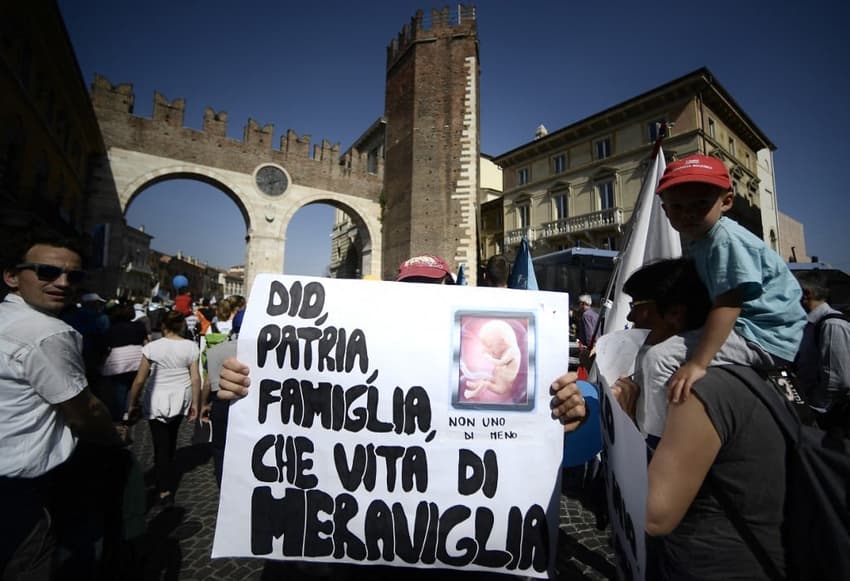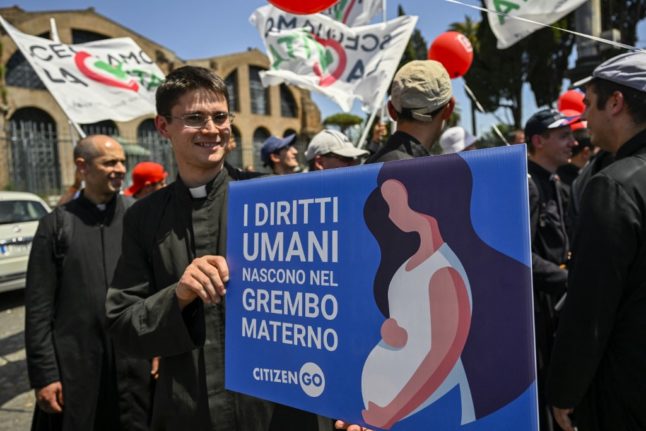What will a right-wing election victory mean for abortion rights in Italy?

The right-wing parties poised to win Italy’s upcoming general elections have a history of denouncing abortion. Could a new conservative government threaten reproductive rights in Italy?
When Italians go to the polls on September 25th, a coalition of three right-wing parties – Giorgia Meloni’s Brothers of Italy, Matteo Salvini’s League and Forza Italia, led by former premier Silvio Berlusconi – are widely expected to win the vote and secure the opportunity to form Italy’s next government.
READ ALSO: Your ultimate guide to Italy’s crucial elections on Sunday
With all three parties to the right of centre – by quite some way, in the case of Brothers of Italy and the League – activists are concerned about what Italy’s most socially conservative government in years could mean for women seeking to access abortions, as they have had the legal right to do here for over four decades.
Here’s what Italian law says about abortion, what the right-wing alliance has promised it will – or won’t – change, and what all this could mean for people in need of abortion care in Italy.
What is Italy’s law on abortion now?
Abortion – formally referred to in Italian as interruzione volontaria di gravidanza or IVG, ‘voluntary termination of pregnancy’ – has been legal in Italy since 1978.
Passed after years of protests and several other failed bills, Legge 194 (‘Law 194’) decriminalized the procedure and entitled women to request it for any reasons of physical or mental health within the first 90 days after conception.
Women can continue to seek an abortion after 90 days if a significant foetal abnormality is present, or if continuing the pregnancy would endanger the woman’s life.
READ ALSO: The long road to legal abortion in Italy
The procedure is offered free of charge to those who qualify for public healthcare in Italy.
To access it, women first must consult a doctor and discuss options “to help her to overcome the factors which would lead her to have her pregnancy terminated”.
If the patient continues to affirm her original choice, she will be issued a certificate either stating that the termination is urgent and can be carried out immediately, or, if it is not deemed urgent, that she can seek the procedure after a obligatory seven-day wait.

Campaigners in front of a banner reading ‘Don’t touch law 194’. Photo by FABRIZIO VILLA / AFP
In reality, the wait for an appointment is likely to be far longer. Law 194 also affirms the right of health workers to refuse to carry out abortions on the grounds of “conscientious objection”.
This has translated into serious gaps in coverage across Italy, with some facilities staffed mostly or even entirely by personnel who decline to deliver abortion services.
READ ALSO: Why abortions in Italy are still hard to access – despite being legal
In fact, a majority of gynaecologists in Italy – 64.6 percent, according to 2020 figures from the Ministry of Health – are registered objectors, as well as 44.6 percent of anaesthesiologists and 36.2 percent of non-medical staff at health facilities.
In several parts of the country, including the regions of Sicily, Basilicata, Abruzzo, Molise and the province of Bolzano, the percentage of gynaecologists refusing to perform abortions is over 80 percent.
These doctors are probably out of step with public opinion in Italy. A 1981 referendum gave voters the opportunity to reject the new abortion law; 68 percent of them voted to keep it.
More recently, an Ipsos poll conducted earlier this year found that 73 percent of people surveyed in Italy said abortion should be legal in all or most cases.
What election promises has Italy’s right-wing alliance made about abortion?
No doubt sensing the lack of appetite for a full-scale repeal of Italy’s abortion law, the right-wing coalition has made clear that that’s not on its agenda.
Abortion doesn’t get a single mention in the joint platform put forward by the Brothers of Italy, League and Forza Italia.
Law 194 does appear in the Brothers of Italy programme, which promises “full application” of the legislation, “starting with prevention” of abortion.
To this end, it pledges the allocation of funds to support single and economically disadvantaged women to carry pregnancies to term, a proposal echoed by the League and presented by both parties as part of a broader drive to reverse Italy’s plummeting birth rate.
The League’s platform also calls for implementation of Law 194’s provisions on the “effective promotion of life”, including by involving non-profit groups – presumably Catholic and other pro-life ones – in pre-abortion counselling.
Forza Italia, historically the most centrist of the three, hasn’t broached the subject at all.
READ ALSO: Salvini vs Meloni: Can Italy’s far-right rivals put differences aside?
Both Meloni and Salvini have faced questions on the campaign trail about their position on abortion, given previous comments calling abortion “a defeat for society” (Meloni), loudly professed Catholicism (Salvini) and support for European allies who have restricted access to abortion, such as Hungarian Prime Minister Viktor Orban (both).
“Law 194 isn’t to be touched,” Salvini told reporters this week. “The last thing Italy needs is a country divided and arguing over the laws in place – which can be improved and updated, but certainly not scrapped.”
Meloni, meanwhile, told a recent interviewer that “I never said I want to modify Law 194, but that I want to apply it”. That includes supporting women who feel obliged to abort for economic or practical reasons, she said – as well as supporting health workers who refuse to provide the procedure.
Why are activists worried a new right-wing government could threaten abortion rights in Italy?
The problem is that Law 194 perhaps does need an overhaul if it is to guarantee access to safe, legal abortions across Italy.
Those who support women’s right to choose have long complained that the 44-year-old law – whose primary objective, the Italian Health Ministry’s website states, “is the social protection of motherhood and the prevention of abortion” – is not fit for purpose.

A demonstrator holds a sign reading 'free to choose' at a rally in defence of Italy's abortion law. Photo by FABRIZIO VILLA / AFP
Law 194 “does not establish in a strong sense women’s right to choice and self-determination: it establishes when access to it is permitted and granted,” Chiara Lalli, a writer and academic with a focus on abortion, told Il Post.
The multiple doctor visits, mandatory counselling session and seven-day “reflection” period are attempts to interfere with women’s decisions, activists say.
READ ALSO: ‘Ugly act’: Outrage in Italy over discovery of foetus graves marked with women’s names
Separately, watchdogs including the United Nations Human Rights Committee, Human Rights Watch and the Council of Europe’s committee of social rights have flagged the high rates of conscientious objectors as a persistent barrier to abortion access in Italy.
While authorities are supposed to ensure that women can access terminations and that objecting doctors can’t refuse care beyond the procedure itself, with no mechanisms to enforce these requirements specified in the existing law, in practice women report facing long delays or being denied assistance altogether.
In the past, both Brothers and Italy and the League have resisted attempts to help the problem, such as by recruiting specifically non-objecting doctors.
While these problems are longstanding, there have been attempts in recent years to put more obstacles between women and abortions – mainly from regional or municipal politicians, who tend to be more explicit in their opposition than those on the national stage.
Many of these have come from members of the three main right-wing parties, which together have governed 14 of Italy’s 20 regions for the past two years.
And with each region largely in charge of managing its own public health service, regional governments have the power to make decisions that significantly affect how and where women can access abortions.
In Le Marche, headed by the Brothers of Italy, the regional government refused to implement 2020 national guidelines from the Ministry of Health that would have extended the window for medical abortions from seven to nine weeks and made it possible for women to obtain abortion pills in outpatient clinics and family planning centres instead of going into hospital.
Abruzzo, whose council is also led by Brothers of Italy, as well as Piedmont and Umbria, two regions governed by the League, resisted the change too.

Priests join an anti-abortion demonstration on May 21st 2022 in central Rome. The placard reads "Human Rights are born in the womb". Photo by Alberto PIZZOLI / AFP
Piedmont has further allowed anti-abortion groups to set up stands in public hospitals, and councillors have proposed funnelling public funds to groups that would pay women not to abort.
The League-run council in Verona declared it a “pro-life city” and called for funding for anti-abortion projects to be written into the town budget, as well as authorizing anti-abortion groups to display promotional material in council buildings.
In the wider region of Veneto, such groups are allowed to offer family counselling services alongside those providing neutral information – a move the League’s manifesto suggests extending when it talks about involving non-profits in “the promotion of life”.
To those who support abortion, it all starts to look like a pattern. “As soon as a right-wing council takes charge, it seems like these issues are at the top of the agenda,” Beatrice Brignone, head of the small left-wing party Possibile, told L’Espresso back in 2020.
READ ALSO: Why an Italian woman was forced to go to 23 hospitals to have an abortion
With threats to abortion access in Italy emerging locally and unchecked at national level, some activists say they would in fact welcome putting Law 194 up for debate under the next government.
“As much to better implement it as to make the necessary modifications … it is time to begin an informed discussion on abortion and free ourselves from the prejudice that the law is untouchable,” comments the Luca Coscioni Association, which advocates for freedom of scientific research and backs abortion rights.
Meloni and her allies have already made clear that such a discussion will not be among their priorities if they win this weekend.
What do other parties say about abortion?
Abortion isn’t an issue for either the centrists Italia Viva or Azione, nor for the populist Five Star Movement.
The centre-left Democratic Party promises the full application of Law 194 throughout the country, without going into further details.
The only concrete proposals come from much smaller parties on the left: Possibile proposes establishing a quota of at least 60 percent of non-objecting staff in each health facility, as well as tracking the service provided by each region and punishing those who fail to meet minimum standards.
The Greens and Left Alliance wants to change recruitment rules to hire more non-objecting medical staff, while +Europa suggests partnering with private clinics to expand access and making medical abortion more widely available as an outpatient procedure.
Comments
See Also
When Italians go to the polls on September 25th, a coalition of three right-wing parties – Giorgia Meloni’s Brothers of Italy, Matteo Salvini’s League and Forza Italia, led by former premier Silvio Berlusconi – are widely expected to win the vote and secure the opportunity to form Italy’s next government.
READ ALSO: Your ultimate guide to Italy’s crucial elections on Sunday
With all three parties to the right of centre – by quite some way, in the case of Brothers of Italy and the League – activists are concerned about what Italy’s most socially conservative government in years could mean for women seeking to access abortions, as they have had the legal right to do here for over four decades.
Here’s what Italian law says about abortion, what the right-wing alliance has promised it will – or won’t – change, and what all this could mean for people in need of abortion care in Italy.
What is Italy’s law on abortion now?
Abortion – formally referred to in Italian as interruzione volontaria di gravidanza or IVG, ‘voluntary termination of pregnancy’ – has been legal in Italy since 1978.
Passed after years of protests and several other failed bills, Legge 194 (‘Law 194’) decriminalized the procedure and entitled women to request it for any reasons of physical or mental health within the first 90 days after conception.
Women can continue to seek an abortion after 90 days if a significant foetal abnormality is present, or if continuing the pregnancy would endanger the woman’s life.
READ ALSO: The long road to legal abortion in Italy
The procedure is offered free of charge to those who qualify for public healthcare in Italy.
To access it, women first must consult a doctor and discuss options “to help her to overcome the factors which would lead her to have her pregnancy terminated”.
If the patient continues to affirm her original choice, she will be issued a certificate either stating that the termination is urgent and can be carried out immediately, or, if it is not deemed urgent, that she can seek the procedure after a obligatory seven-day wait.

In reality, the wait for an appointment is likely to be far longer. Law 194 also affirms the right of health workers to refuse to carry out abortions on the grounds of “conscientious objection”.
This has translated into serious gaps in coverage across Italy, with some facilities staffed mostly or even entirely by personnel who decline to deliver abortion services.
READ ALSO: Why abortions in Italy are still hard to access – despite being legal
In fact, a majority of gynaecologists in Italy – 64.6 percent, according to 2020 figures from the Ministry of Health – are registered objectors, as well as 44.6 percent of anaesthesiologists and 36.2 percent of non-medical staff at health facilities.
In several parts of the country, including the regions of Sicily, Basilicata, Abruzzo, Molise and the province of Bolzano, the percentage of gynaecologists refusing to perform abortions is over 80 percent.
These doctors are probably out of step with public opinion in Italy. A 1981 referendum gave voters the opportunity to reject the new abortion law; 68 percent of them voted to keep it.
More recently, an Ipsos poll conducted earlier this year found that 73 percent of people surveyed in Italy said abortion should be legal in all or most cases.
What election promises has Italy’s right-wing alliance made about abortion?
No doubt sensing the lack of appetite for a full-scale repeal of Italy’s abortion law, the right-wing coalition has made clear that that’s not on its agenda.
Abortion doesn’t get a single mention in the joint platform put forward by the Brothers of Italy, League and Forza Italia.
Law 194 does appear in the Brothers of Italy programme, which promises “full application” of the legislation, “starting with prevention” of abortion.
To this end, it pledges the allocation of funds to support single and economically disadvantaged women to carry pregnancies to term, a proposal echoed by the League and presented by both parties as part of a broader drive to reverse Italy’s plummeting birth rate.
The League’s platform also calls for implementation of Law 194’s provisions on the “effective promotion of life”, including by involving non-profit groups – presumably Catholic and other pro-life ones – in pre-abortion counselling.
Forza Italia, historically the most centrist of the three, hasn’t broached the subject at all.
READ ALSO: Salvini vs Meloni: Can Italy’s far-right rivals put differences aside?
Both Meloni and Salvini have faced questions on the campaign trail about their position on abortion, given previous comments calling abortion “a defeat for society” (Meloni), loudly professed Catholicism (Salvini) and support for European allies who have restricted access to abortion, such as Hungarian Prime Minister Viktor Orban (both).
“Law 194 isn’t to be touched,” Salvini told reporters this week. “The last thing Italy needs is a country divided and arguing over the laws in place – which can be improved and updated, but certainly not scrapped.”
Meloni, meanwhile, told a recent interviewer that “I never said I want to modify Law 194, but that I want to apply it”. That includes supporting women who feel obliged to abort for economic or practical reasons, she said – as well as supporting health workers who refuse to provide the procedure.
Why are activists worried a new right-wing government could threaten abortion rights in Italy?
The problem is that Law 194 perhaps does need an overhaul if it is to guarantee access to safe, legal abortions across Italy.
Those who support women’s right to choose have long complained that the 44-year-old law – whose primary objective, the Italian Health Ministry’s website states, “is the social protection of motherhood and the prevention of abortion” – is not fit for purpose.

Law 194 “does not establish in a strong sense women’s right to choice and self-determination: it establishes when access to it is permitted and granted,” Chiara Lalli, a writer and academic with a focus on abortion, told Il Post.
The multiple doctor visits, mandatory counselling session and seven-day “reflection” period are attempts to interfere with women’s decisions, activists say.
READ ALSO: ‘Ugly act’: Outrage in Italy over discovery of foetus graves marked with women’s names
Separately, watchdogs including the United Nations Human Rights Committee, Human Rights Watch and the Council of Europe’s committee of social rights have flagged the high rates of conscientious objectors as a persistent barrier to abortion access in Italy.
While authorities are supposed to ensure that women can access terminations and that objecting doctors can’t refuse care beyond the procedure itself, with no mechanisms to enforce these requirements specified in the existing law, in practice women report facing long delays or being denied assistance altogether.
In the past, both Brothers and Italy and the League have resisted attempts to help the problem, such as by recruiting specifically non-objecting doctors.
While these problems are longstanding, there have been attempts in recent years to put more obstacles between women and abortions – mainly from regional or municipal politicians, who tend to be more explicit in their opposition than those on the national stage.
Many of these have come from members of the three main right-wing parties, which together have governed 14 of Italy’s 20 regions for the past two years.
And with each region largely in charge of managing its own public health service, regional governments have the power to make decisions that significantly affect how and where women can access abortions.
In Le Marche, headed by the Brothers of Italy, the regional government refused to implement 2020 national guidelines from the Ministry of Health that would have extended the window for medical abortions from seven to nine weeks and made it possible for women to obtain abortion pills in outpatient clinics and family planning centres instead of going into hospital.
Abruzzo, whose council is also led by Brothers of Italy, as well as Piedmont and Umbria, two regions governed by the League, resisted the change too.

Piedmont has further allowed anti-abortion groups to set up stands in public hospitals, and councillors have proposed funnelling public funds to groups that would pay women not to abort.
The League-run council in Verona declared it a “pro-life city” and called for funding for anti-abortion projects to be written into the town budget, as well as authorizing anti-abortion groups to display promotional material in council buildings.
In the wider region of Veneto, such groups are allowed to offer family counselling services alongside those providing neutral information – a move the League’s manifesto suggests extending when it talks about involving non-profits in “the promotion of life”.
To those who support abortion, it all starts to look like a pattern. “As soon as a right-wing council takes charge, it seems like these issues are at the top of the agenda,” Beatrice Brignone, head of the small left-wing party Possibile, told L’Espresso back in 2020.
READ ALSO: Why an Italian woman was forced to go to 23 hospitals to have an abortion
With threats to abortion access in Italy emerging locally and unchecked at national level, some activists say they would in fact welcome putting Law 194 up for debate under the next government.
“As much to better implement it as to make the necessary modifications … it is time to begin an informed discussion on abortion and free ourselves from the prejudice that the law is untouchable,” comments the Luca Coscioni Association, which advocates for freedom of scientific research and backs abortion rights.
Meloni and her allies have already made clear that such a discussion will not be among their priorities if they win this weekend.
What do other parties say about abortion?
Abortion isn’t an issue for either the centrists Italia Viva or Azione, nor for the populist Five Star Movement.
The centre-left Democratic Party promises the full application of Law 194 throughout the country, without going into further details.
The only concrete proposals come from much smaller parties on the left: Possibile proposes establishing a quota of at least 60 percent of non-objecting staff in each health facility, as well as tracking the service provided by each region and punishing those who fail to meet minimum standards.
The Greens and Left Alliance wants to change recruitment rules to hire more non-objecting medical staff, while +Europa suggests partnering with private clinics to expand access and making medical abortion more widely available as an outpatient procedure.
Join the conversation in our comments section below. Share your own views and experience and if you have a question or suggestion for our journalists then email us at [email protected].
Please keep comments civil, constructive and on topic – and make sure to read our terms of use before getting involved.
Please log in here to leave a comment.